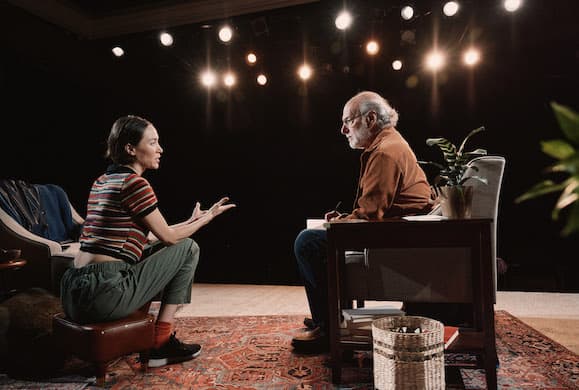The Actors in ‘Job’ Handle Their Characters’ One-on-One Like Tennis Pros
The twists that occur as the show — which is frequently hilarious — surges to a breathtaking conclusion leave us with disturbing questions about both characters, and how they’ve exploited, or been exploited by, the modern world.

It would seem the great actor Peter Friedman has been drawn of late to characters facing harrowing pressures in their professional lives. Fresh off his stint as a long-suffering senior lackey to a tyrannical media tycoon in the gloriously cynical series “Succession,” Mr. Friedman is now cast, in the new play “Job,” as a crisis therapist whose latest patient proves as demanding, and as terrifying, as any boss you could imagine.
In this taut, whip-smart psychological thriller by Max Wolf Friedlich, the actor plays Loyd, a baby-boomer psychologist tasked with evaluating the much younger Jane, who has been suspended from her high-flying job at a tech conglomerate after a video of her having a breakdown during a presentation went viral. Both are Berkeley graduates; Loyd attended the prestigious university at a time when the neighborhood was a symbol for progressive politics and culture, and on the surface, at least, he still invites the attendant clichés, even admitting to a fondness for making his own jewelry.
The 20-something Jane, played by a captivating Sydney Lemmon, is the last person on earth you would catch stringing beads together or singing “Kumbaya.” A type-A overachiever down to her personal hygiene regimen — “I have to nail flossing,” she tells Loyd — she has no time for either the glibly idealistic rich kids who were her college friends or Loyd’s ilk. The play and, presumably, the therapy session begin with her threatening him in the most extreme way conceivable, lest he consider giving an unfavorable report to her corporate overlords.
Her ferocity is in part a shield, and born of desperation. “I’m really scared … of you not being able to make the right decision,” she explains to Loyd; her identity is so bound up in her work — in the notion of being successful — that she can’t seem to grasp a life without it. Generational disputes ensue, inevitably extending to the digital universe that is Jane’s native habitat.
“You don’t think your phone has contributed to why you’re here today?” Loyd asks, to which Jane responds, “People do bad things, not phones,” then poses her own query: “Why are boomers so upset about us using technology when they’re the ones getting rich off of it?”
If you’re assuming at this point that Mr. Friedlich has written an indictment of Generation Z, think again: The twists that occur as the show — which is frequently hilarious — surges to a breathtaking conclusion leave us with disturbing questions about both characters, and how they’ve exploited, or been exploited by, the modern world.
The playwright’s approach is not entirely naturalistic; sudden blackouts are followed by seeming retakes, and the disruptive noises that increasingly pop up in Jessie Char and Maxwell Neely-Cohen’s sound design — a whip cracking, a car motor roaring, aggressive sex, gunshots — can suggest imagined or symbolic events, or haunted memories. Scott Penner’s set, in contrast, offers a kind of purposeful banality; “Your office has a sort of hippie Haight-Ashbury thing going on,” Jane tells Loyd.
The two actors keep the joint lit up for the show’s roughly 80-minute duration, summoning their characters’ different styles and rhythms like ace tennis players under director Michael Herwitz’s savvy coaching. Where Ms. Lemmon’s Jane is all manic energy and anxiety, Mr. Friedman’s Loyd exudes, even in moments of understandable panic, a reassuring authority, in which we only gradually come to recognize shades of potential arrogance.
Still more sinister qualities have been suggested by the time “Job” runs its course. Yet for all its timely and eloquently expressed concerns — which, be warned, produce a few graphic accounts of grotesque acts — the play offers more tantalizing questions than answers, and its glimmers of menace make it no less buoyantly entertaining.

